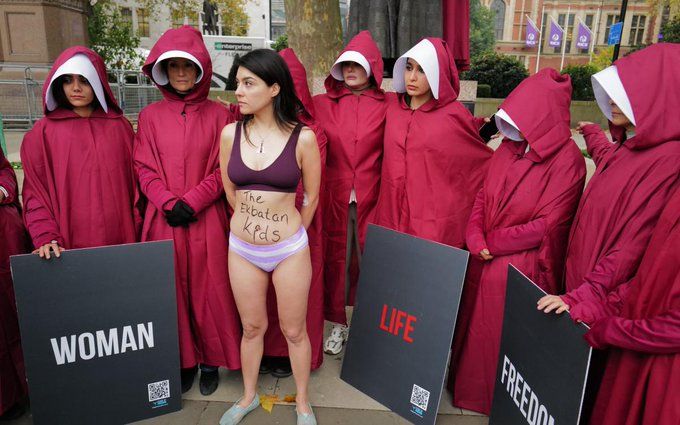
In a disturbing case of events, Iran recently announced that it has set up mental health clinics to 'treat' women who refuse to wear hijabs. This move comes as a treatment for quitting 'hijab removal' to cure women who refuse to wear hijab. In Iran, a movement called "Women, Life, Freedom" has swept across the country as women join forces to fight for their rights and challenge the nation’s strict dress code. This movement has grown in response to Iran's treatment of women, particularly its strict hijab rules, which many have begun to openly defy.
Recently, a female university student from Islamic Azad University made headlines when she stripped down to her underwear in protest of the forced dress code. In response to her act, the administration labeled her "mentally unstable." The incident highlighted the rising tensions surrounding women's rights and the hijab regulations.
Hijab Defiance Labeled as Mental Illness: Iran Opens Controversial ‘Treatment’ Clinic”
— Smriti Sharma (@SmritiSharma_) November 14, 2024
Iran’s new “hijab clinic” labels women defying mandatory headscarves as needing mental health treatment. A disturbing attempt to pathologize dissent and silence voices for #WomanLifeFreedom. pic.twitter.com/8e8jILJozD
How will the mental health clinic function?
Mehri Talebi Darestani, head of the Women and Family Department at the Tehran Headquarters for the Promotion of Virtue and Prevention of Vice, announced plans to establish a mental health clinic. Darestani has been tasked with looking after this mental health clinic. She said the clinic, "will be for the scientific and psychological treatment of removing the hijab, specifically for the teenage generation, young adults, and women seeking social and Islamic identity."
Iran sets up mental health clinic to ‘treat’ women who refuse to wear hijab. I’m sure these women will be treated just as well as they treat the gay community. pic.twitter.com/ZfTdPFw8u4
— Imtiaz Mahmood (@ImtiazMadmood) November 13, 2024
The mental health clinic is seen as a project to promote “dignity, modesty, chastity, and hijab”. Darestani however also mentioned that it is up to women to visit the clinic and it is not mandatory. This clinic will be supervised by Iran’s Headquarters.
Activists around the globe aggressively react to this move
Introducing the 'Mental Health' centre for women to 'treat' them for refusing to wear hijab has invoked aggressive responses from activists around the world. Even netizens have come forward to all this a 'shameful' act.
“The idea of establishing clinics to ‘cure’ unveiled women is chilling, where people are separated from society simply for not conforming to the ruling ideology," Sima Sabet, a UK-based Iranian journalist said, according to The Guardian.
Diana Eltahawy, Amnesty’s Middle East and North Africa director, said: “In a sinister attempt to wear down resistance to compulsory veiling in the wake of the ‘Woman Life Freedom’ uprising, Iran’s authorities are terrorising women and girls by subjecting them to constant surveillance and policing, disrupting their daily lives and causing them immense mental distress.